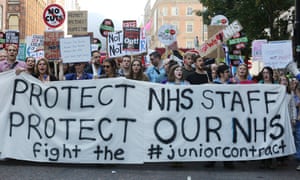More than 2,000 medics and students tell health secretary days after he tried to defuse anger that proposed contracts are unfair and risk patient safety
Doctors and health workers at a demonstration in Manchester. Photograph: Barbara Cook/Demotix/Corbis
Rank-and-file junior doctors have warned Jeremy Hunt he must make further concessions on proposed new contracts to prevent them striking or taking other industrial action over pay and weekend working.
More than 2,000 medics and students have written to the health secretary saying his attempts to impose new terms and conditions on 53,000 NHS staff “remain unfair to doctors and unsafe to patients”.
Letter from junior doctors to Jeremy Hunt
Their reaction to Hunt’s attempt to defuse the anger of many junior doctors in England has become public before the British Medical Association (BMA), their trade union, officially responds to the government’s move.
But the warning shot fired by the self-styled The Junior Doctors indicates continuing grassroots opposition to the new contracts despite Hunt’s effort last Thursday to quell unrest.
Hunt indicated that he was prepared to reconsider his plan to reclassify working on Saturdays between 7am and 10pm as part of the normal working week for which doctors would only be paid at the standard rate.
He also promised that existing incentives for qualified young doctors to go into emergency medicine and general practice, where there are shortages, would continue.
By Sunday afternoon, the junior doctors’ letter, sent to Hunt on Saturday and a copy of which has been given to the Guardian, had been supported by 1,618 junior doctors, 193 consultants or GPs and 198 medical students, most members of the BMA.
Jeremy Hunt. Photograph: David Gadd/Sportsphoto Ltd/Allstar
The letter questions using complex data on higher mortality in hospitals at weekends to justify government policy behind the proposed contracts. It points out that Sir Bruce Keogh, NHS England’s medical director, is co-author of a BMJarticle last month which says in a section interpreting the “weekend effect” in hospitals: “It is not possible to ascertain the extent to which these excess deaths may be preventable, to assume that they are avoidable would be rash and misleading.”
While welcoming Hunt’s promises of a new system that made sure juniors were not exploited or overworked, the doctors added that “we remain perplexed, as the government’s proposals will remove vital safeguards that penalise trusts for overworking doctors”.
This is a reference to financial deterrents that force hospitals to pay a doctor significantly more once they have worked more than 48 hours in a week.
The BMA has warned that junior doctors working in parts of the NHS that involve a lot of evening and weekend work, such as emergency medicine, would be left worse off. This, it says, would be disastrous for A&Es, which are already struggling to recruit and retain staff.
The junior doctors’ letter expresses concern that “the removal of pay protection and pay progression intended to reflect clinical experience gained from years of NHS service will discourage doctors from carrying out medical research and disproportionately affect women who may work less than full-time”.
Finally, despite Hunt’s assurances he is not conducting a cost-cutting exercise, the doctors are worried by the health secretary saying “on average” doctors will not lose out under the proposed changes.
“We feel strongly that not one hard-working doctor should be financially worse off, and that doctors working unsocial hours must not have their pay cut,” their letter said, adding that the group stands “squarely behind the BMA”.
Dr Anna Warrington, a prime mover behind the letter and a mass protest to be held in London next Saturday, said: “Doctors are personally invested in the NHS, as well as professionally: we are vocationally motivated, we have a true concern and empathy for our patients, and we regularly go above and beyond to ensure their care.
Advertisement
“It is natural that when we feel our NHS and our patients are at risk, we should make a personal as well as a professional effort to combat that risk.
“That means as well as supporting our professional body, the BMA, we will extend a personal effort to ensure our patients’ care. That’s why so many of us signed this letter. It’s the personal touch that makes us good doctors, and we want our patients to know we’re working in their interests as much as our professional body is.”
Warrington said 14,000 healthcare professionals and supportive patients had indicated they would attend the rally and march, due to begin in Waterloo Place in central London at 2pm on Saturday and end at Parliament Square four hours later.
The Department of Health said: “Clear and independent clinical evidence states that mortality rates are higher at the weekend and we are committed to changing that by putting in place a seven-day NHS.”
Analysis Is Jeremy Hunt really backing down in the junior doctors row?
Analysis: Health secretary’s attempt to mollify angry medics could be enough to head off a strike – or it could be seen as a bid to divide and rule.
“That doesn’t mean making doctors work longer hours, it means working differently to improve patient safety,” a spokesperson said, repeating assurances that it was not cost-cutting. “We are not seeking to save a penny from the pay bill. We have also guaranteed that the great majority of junior doctors will be at least as well paid as they would be now. We urge the BMA to come back to the table and look forward to their formal response.”
The DH points to the same BMJ article cited by the doctors concerning deaths at the weekend, saying the higher risk of death can partly be explained by the reduced support services available.
It argues that other work led by Keogh said the difference was likely to be down to variable staffing levels, absence of consultants and a lack of consistent specialist diagnostic, community and primary care services.
The BMJ article says about 11,000 more people each year die if they are admitted to hospital on a Friday, Saturday, Sunday or Monday compared with other days of the week.
The authors say the number cannot be ignored and “we need to determine exactly which services need to be improved at the weekend to tackle the increased risk of mortality”.






No comments:
Post a Comment